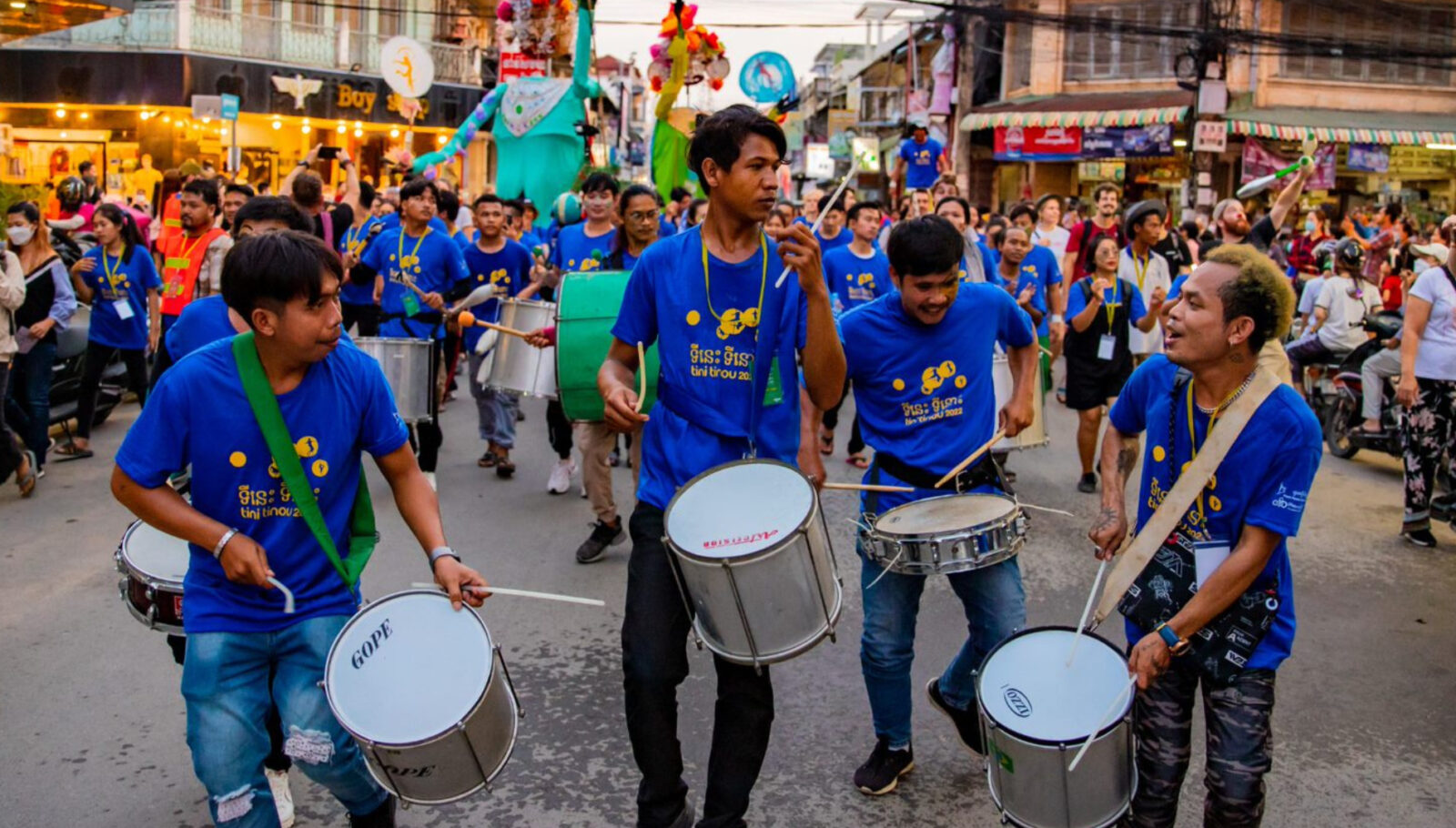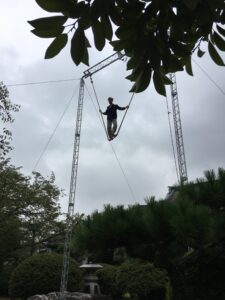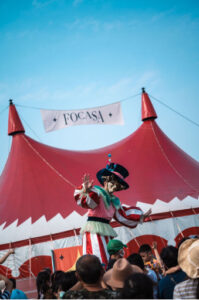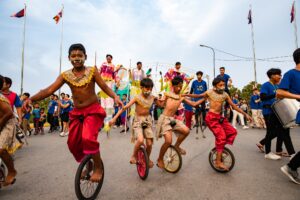Embrace and Engage: A Reminder to International Circus Festivals

As a traveling art form, circus—not to mention those who create it and help produce it—has a unique power to engage with the many people and places they encounter, all the while working to be part of something bigger. Originally published in the DuMaXi quarterly, brought to you by Taiwan’s Formosa Circus Art (FOCA), this interview calls together Independent Arts Manager Gwen Hsin-Yi Chang of AxE Europa and Phare Circus’ Kim Chien-Wen Hsu to speak to the connections they and their companies have been able to achieve.
When it comes to circus, most people immediately think of mobile tents. Touring performances and nomadic lifestyles seem to be second nature to circus artists. To most people in other professional fields, though, the international circus sector is still a mysterious area to join and engage in.
In this article, we invite two guests to talk about their experiences at international circus events. Gwen Hsin-Yi Chang previously served as an international affairs officer at the National Kaohsiung Center for the Arts – Weiwuying, and Kim Chien-Wen Hsu is now the Social Enterprise Development Manager at Phare – The Cambodian Circus. They both joined circus from other industries, and have represented their organizations at circus platforms and festivals, as well as working with the Circus Asia Network (CAN). Their experiences testify to what circus can do as a diplomatic channel.
How did you start in the circus industry?
Chang: I have worked in the performing arts industry for nearly two decades. Starting in 2017, I have represented the National Kaohsiung Center for the Arts–Weiwuying at major circus festivals, including BIAC (Marseille, France), CircusInfo (Finland), CIRCa (Auch, France), and MICC (Montreal, Canada) every July. These events have informed my curatorial approach to the Weiwuying Circus Platform, the only circus-oriented event available in Taiwan.

Hsu: I fell in love with performing arts after learning about theater aesthetics in college. I have been obsessed with Cirque du Soleil since I watched its show in Taiwan. In 2015, I was working in Cambodia and enjoyed performances by the local Phare Circus. Eventually, I saw all its shows. In 2018, I was lucky to be selected for its job recruitment.
Chang: It’s so encouraging to hear how a staff member started as a fan.
Hsu: Our director Dara [Huot] would like to expand into the Mandarin-speaking market, so he hired a Taiwanese candidate. He called me a “big Phare fan.” Taiwan was investing more in the prospering cultural and creative industry at the time. Before Weiwuying officially opened, Dara was impressed that it had sent out staff members to attend and connect with international festivals. On the other hand, education in Cambodia did not pay attention to creative mindsets. As a result, Phare hired many foreign employees to facilitate international development with their experiences and expertise.
What’s been the most memorable international circus event to you?

Hsu: Phare organizes its own circus festival every other year. Instead of large theaters for over 1,000 people, it chooses venues that seat up to 500 people for closer connections. I was inspired by its performances in such conditions. Phare emphasizes artist engagement; besides performances, it also invites international teams to create smaller pieces within three to seven days. These works fascinate me as the different teams collaborate and create sparks.
Chang: I started from scratch, and the 2017 BIAC in Marseille was the first time I represented Weiwuying. I was very anxious about extensively engaging with professionals. Fortunately, circus is diverse and lively by nature, and the circus tents by the harbor offered a liberating, friendly, and open environment for engagement. I also remember a local circus festival, organized by Setouchi Circus Factory in Takamatsu, Japan, and held close to the Seto Inland Sea. This event worked with shrines, public spaces, and private venues (such as udon noodle stores), and performed at Japanese gardens. Local grandpas and grandmas attended with their own chairs. Catering services for visitors were prepared by local dwellers with local ingredients. While participating in the festival, it was memorable to learn and become immersed in the city.
What is special about these circus events and insiders?
Hsu: Compared to other fields, circus requires cooperation and alignment. Performances can never be completed alone. One-man shows also require a team behind the scenes. Everyone tries to discuss and make decisions with consensus and without hierarchy.
Chang: Exactly. Circus artists speak their minds and give substantial feedback. Their performances are very physical, and their communications are direct, open, and transparent.
Hsu: Even though Phare is larger in scale, we still attempt to make decisions by consensus. Our leadership team values every opinion. Progress moves slowly [laughs], but every idea is elaborated. Once we are aligned with those objectives after extensive discussions, we can work towards collective goals.

Chang: When I started to attend circus events in Europe, I was worried about their responses. Surprisingly, everyone was willing to talk and explain things to me. I felt embarrassed to admit it as a rookie, but people embraced me readily and introduced me to other people. I think in the circus world, everyone benefits from a larger pie.
Hsu: These artists join circus out of passion. They simply believe more people are needed in the circus world, wherever you are from. Everyone is equal and happy to share. During pitch sessions, many pitchers confess about challenges and issues, rather than covering them up. Participants also give a lot of sincere feedback and advice. It seems that circus people open their minds easily [laughs].
Chang: People welcome newcomers, and give genuine responses. Everyone feels closer to each other in the process, so circus events are often more intimate than other festivals or events.
Compared to other countries, where does Taiwan stand in terms of its circus development?

Chang: Honestly, we need more companies, but it’s increasing. For example, FOCA’s FOCASA festival has attracted more audiences to watch circus in Taiwan this year. However, this is based on what the company has been working on for ten years.
Hsu: After its pioneering efforts, people have recognized circus’ potential in Taiwan, which has contributed to the current level of achievement. I think the circus industry in Taiwan is ready to boom.
Chang: Government policies need to catch up now to give circus its own category, and provide proper resources/subsidies. Over the years, circus has achieved a lot for Taiwan in terms of international connection. It’s time to acknowledge circus. I think the next five years will be crucial.
How should professionals and general audiences prepare themselves to participate in/watch circus?
Hsu: You never know what you will encounter in circus. Stay adventurous, be open to engaging with circus artists, and enjoy every moment.
Chang: People can include circus festivals in their travel itineraries. These festivals are closely connected to their host cities, so people can attend and also learn about the local cultures. It would be fun to visit several circus festivals during your trip!
Hsu: You need practical gear as well, such as windbreakers, rain jackets, food, and water bottles. Circus tents are giant outdoor tents, so prepare as if you are camping.
Chang: Indeed, treat circus festivals like outdoor music festivals. Go with the flow and adapt to various changes in weather or conditions. It’s important to embrace and enjoy the magic in circus.

This interview originally published in Mandarin Chinese and shared with us by FOCA's Martina Li. Special thank you to Stella Tsai for the translation.
Images shared by Martina Li and FOCA. Main image: Phare Circus' Tini-Tinou Festival
Editor's Note: At StageLync, an international platform for the performing arts, we celebrate the diversity of our writers' backgrounds. We recognize and support their choice to use either American or British English in their articles, respecting their individual preferences and origins. This policy allows us to embrace a wide range of linguistic expressions, enriching our content and reflecting the global nature of our community.
🎧 Join us on the StageLync Podcast for inspiring stories from the world of performing arts! Tune in to hear from the creative minds who bring magic to life, both onstage and behind the scenes. 🎙️ 👉 Listen now!
